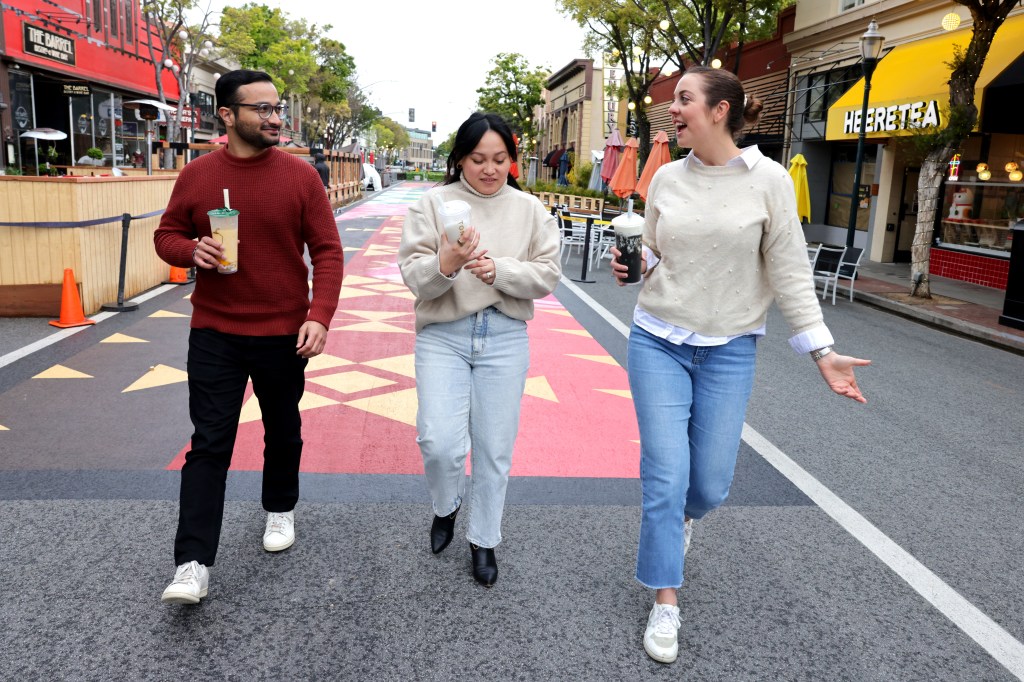Verkada employees Aditya Angria (left), Julie Ann Barroso and Virginia Ramsey after buying drinks at Tong Sui in downtown San Mateo, California on Thursday, April 4, 2024. returns to the office. Verkada plans to refund a total of $30. As part of the company's 3-3-3 program, employees are paid if three or more employees spend $30 on food and drink at local businesses after 3 p.m. (Ray Chavez/Bay Area News Group)
In Silicon Valley, if there's a problem, there's an app to solve it.
But to energize small businesses while reducing social isolation, security technology company Verkada is bringing businesses back to basics and offline through a unique work perk.
It's called the “3-3-3” program. After 3 p.m., three or more employees can spend up to $30 on food and drinks at businesses within walking distance of the company's headquarters in downtown San Mateo.
The problem of social isolation and loneliness has become a national issue, with San Mateo County becoming the first in the nation to declare the issue a public health emergency in February and pledging to invest $1 million to fight loneliness this month. attracted a lot of attention.
And across the region, small businesses are still struggling to adapt to a business environment in which many of their traditional customers continue to work from home.
Verkada said he believes the program is mutually beneficial to the company as it helps solve both issues and helps employees stay motivated while giving them the opportunity to build camaraderie at work. Ta.
Kameron Rezai, Verkada's chief financial officer, said, “We're in the office five days a week, and working (3-3-3) is important for people's careers and for the company.'' I believe it is a very good thing for everyone.” I helped create the program last April. “His second feedback that we got was that people are using it as an opportunity to connect across departments.”
Many of Verkada's customers are small and medium-sized businesses, so the company naturally wants to help neighboring countries, Rezai said.
“Many of our customers are small burger chains and ice cream shops. That's the bread and butter of who we sell to,” he said.
Verkada, a homegrown security technology developer, was founded in 2016 in CEO Filip Kaliszan's San Mateo living room. The company now has 16 offices around the world, including Tokyo and London, and has expanded its 3-3-3 program to all of its offices.
Rezai said that while the company has grown from a startup to a global company, San Mateo as a community is in its DNA.
“We also decided to always keep our headquarters in downtown San Mateo. We feel connected to our restaurants and bars and other places, many of whom also happen to be our customers, so we feel connected to the community. It’s important for us to try to build connections,” he said.
The company's headquarters currently employs just over 1,100 people. And so far, Verkada has spent more than $300,000 at various nearby businesses.
One of Verkada employees' favorite spots to take advantage of their 3-3-3 benefits is at one of the many boba (bubble tea) shops around downtown.
Tong Sui on South B Street is one such store.
The San Mateo branch, established in Sunnyvale, opened late in the pandemic in 2021. This period was marked by the emergence of more potent COVID-19 variants across the United States, leading to unpredictable cycles of lockdowns and reopenings.
“People still didn't want to go out, especially shopping in person,” said Judith Xiao, Tonsui's marketing and sales manager. “We had to rely heavily on our distribution platform to increase our business volume.”
Hsiao said initiatives like Verkada are helping businesses survive in the post-pandemic years. Many small and medium-sized businesses are still struggling, he said, as many employees continue to work from home and are less likely to go to stores near their offices.
“Thanks to Verkada providing the afternoon tea budget for our employees, our sales increased significantly and we were able to pay our employees,” Xiao said. “It's allowed us to survive in downtown San Mateo.”
The city is also paying attention to this system.
“I think what they're doing is a very innovative approach, and we're seeing the impact,” said Mayor Lisa Diaz Nash. “Businesses and merchants throughout the city of San Mateo are talking about the fact that Verkada employees are coming.”
She said the initiative not only injected money into the local economy, but also contributed to the city's efforts to revitalize downtown.

“The situation is very mixed, but there are positive trends,” Diaz-Nash said of the local economic situation. “Small businesses have been hit hard during the pandemic, and ours was no exception. But the city took very proactive action to do whatever we could.”
During the pandemic, the city set up a parklet program to help restaurants and eateries stay open and encouraged outdoor dining. In 2021, the City Council voted to keep a portion of B Street permanently closed to create more space for outdoor dining and pedestrians.
Diaz-Nash said other large employers in the region are considering implementing similar programs for their employees.
“It may not be exactly what Verkada is doing, but what works for them? How can they adjust?” she said.
Julie Ann Barroso, a Verkada sales recruitment manager originally from Guam and now living in San Mateo, said the lessons learned from 3-3-3 are that while there are benefits to working from home, digital relationships are He said that it is not a substitute for interaction.
“I'm telling you, I thought I'd be working from home my whole life,” Barroso said. “When the pandemic hit, we realized we needed to socialize. We need to learn how people interact. It's very difficult to read the world and raise money just on Zoom.”


